Canada claps back on Trump tariff news
Meanwhile, several US trade groups applauded the latest trade announcement.
Meanwhile, several US trade groups applauded the latest trade announcement.
Section 232 tariffs of 50% on imported steel will go into effect on Wednesday with few exceptions, according to a top White House official.

Just when we thought we’d get a breather from tariffs news, we’re back in the thick of it.

Briefing on the stay motion will be completed by June 9. If a stay pending appeal is granted, it will likely remain in effect until the Court of Appeals issues a decision, which could be months in the future. The case is almost certain to be appealed to the Supreme Court.
Timna Tanners, managing director of equity research for Wolfe Research, will be the featured speaker on the next SMU Community Chat. Timna has coined Sheet Storm, Galv Galore, and Rebarmageddon. Her forecasts and insights are always though provoking. And she’s not afraid to speak her mind. So it's no surprise that she's one of our most popular guests!

International trade attorneys discuss court decisions this week that left many importers, manufacturers, and even casual observers wondering: What’s next?
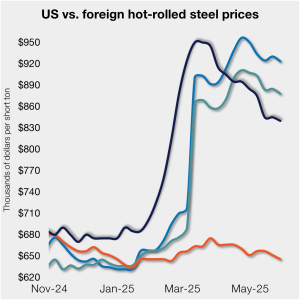
Domestic hot-rolled coil prices moved lower again, maintaining the downward move seen in eight of the last 10 weeks.
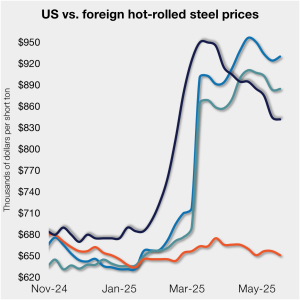
Domestic hot-rolled (HR) coil prices were flat this week after declining seven of the last nine weeks. Offshore prices have also eroded in recent weeks, though not nearly as significantly as in the US.

Since March 21 when UAE announced plans to invest $1.4 trillion in the US, including an aluminum smelter, the market has been waiting for details. Now, we have some.
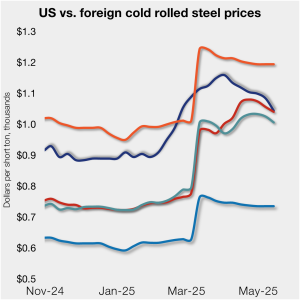
US cold-rolled (CR) coil prices were down again this week, slipping six weeks in a row and seeing the sharpest drop-off since last July.
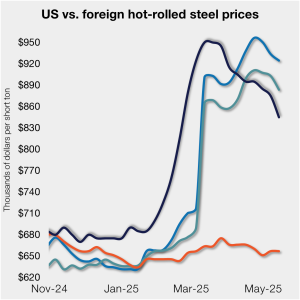
Domestic hot-rolled (HR) coil prices fell this week, now down seven of the last eight weeks.

Quotas featured in the UK agreement may show up in future deals.

CRU Group revised down its forecast for North American auto production by about 800,000 to 14.7 million this year.

The UK deal may signal relaxation of the heaviest tariffs. The suspension of the reciprocal tariffs greater than 10% - remember, 57 countries were hit with that - ends on July 9. But it could be extended. If more deals like the one with the UK are struck, the suspensions may continue to permit more agreements - relieving global markets of considerable worry.

Here are highlights of what’s happened and a few things to keep an eye on this upcoming week.
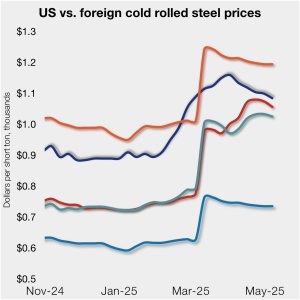
US cold-rolled (CR) coil prices moved lower again this week, slipping five weeks in a row now. Most offshore markets mirrored the move, ticking down as well.
Meanwhile, its Canadian operations have been hurt by the broader tariffs proposed by the United States.
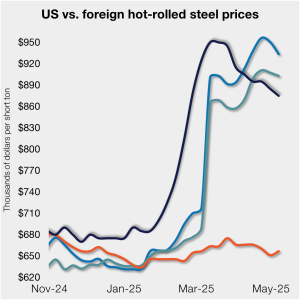
Domestic hot-rolled (HR) coil prices moved lower this week, now down six of the last seven weeks. Recent price erosion has been seen in offshore markets, keeping the price gap between imports and domestic products largely flat week on week (w/w).
The US Commerce Department has set up an “inclusions process” to add derivative aluminum and steel articles within the scope of the new Section 232 tariffs.
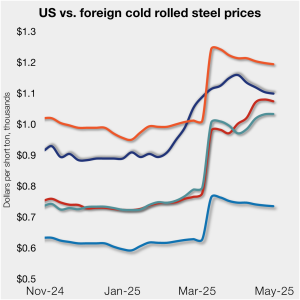
US cold-rolled (CR) coil prices edged lower again this week, slipping four weeks in a row now. Most offshore markets mirrored the move, ticking down marginally as well.
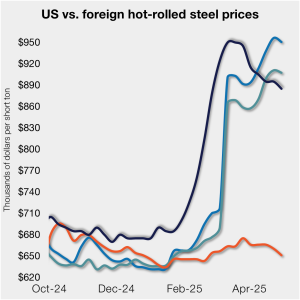
Section 232 returned on March 12, and since then, the price gap between offshore and US hot band has tightened.

United Airlines raised eyebrows earlier this month when it provided two forecasts for 2025 – one assuming a relatively stable economy and another assuming a recession. The reason? Uncertainty around the impact of President Trump’s policy shocks on the broader economy. And it sometimes feels like we’re seeing a battle between those two narratives (stable vs recession) play out within in the pages of this newsletter.

President Trump cast a wide net with the proposed, reciprocal tariffs. The negotiating stage will be critical to determining the success of his strategy. And for those suffering tariff whiplash, don’t expect the pace of change to slow down just because the reciprocal tariffs are entering a negotiating phase.
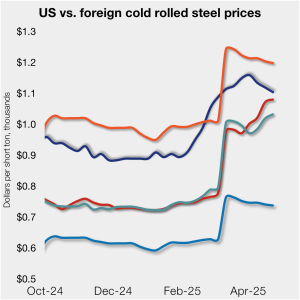
US cold-rolled (CR) coil prices declined again this week, slipping for a third straight week. Most offshore markets did the opposite, moving higher this week.
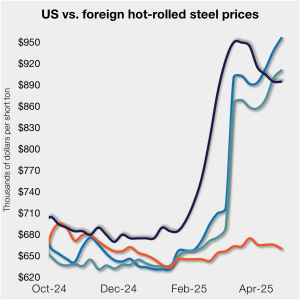
Domestic hot-rolled coil prices were flat this week after dropping for four straight weeks. Most offshore markets bucked the trend and gained ground.
SMU’s Steel Demand Index has moved into contraction, according to late April indicators. The slowdown comes in response to growing tariff uncertainty after the index reached a four-year high in late February.
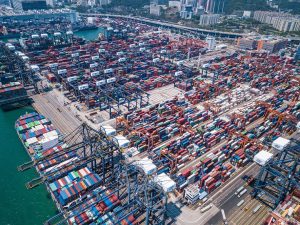
Representatives from bulk commodity shippers and consumer goods argued against the fees, saying it could cripple supply chains because of the very dominance that China has in the existing shipping fleet.
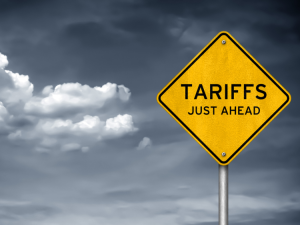
Operational results painted a picture of a company that produced more aluminum but shipped less of it as a result of tariffs and timing mismatches.

A modest week-to-week change in HR price understates a huge swing in expectations.
The union is also urging stronger enforcement against countries such as China which break trade rules, and a coordinated Canada-US strategy to protect union jobs across the North America